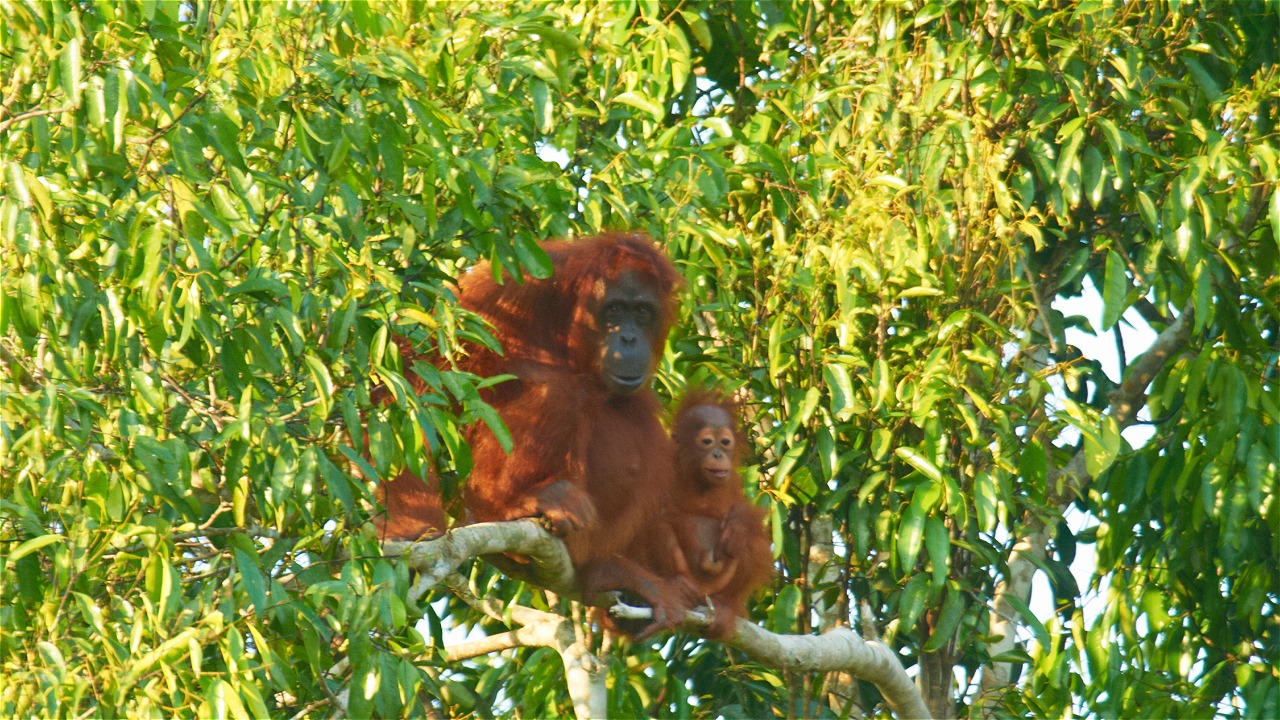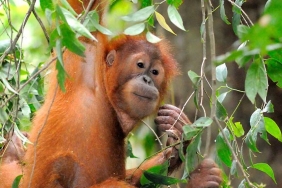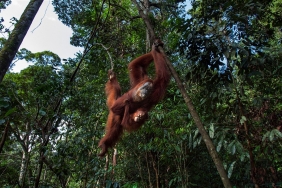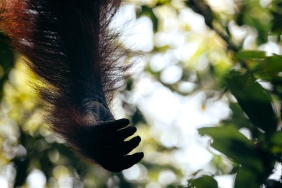ORANGUTAN FOUND AGAIN NEAR VILLAGE
by: Lia Syafitri
PONTIANAK (19/11) - An individual orangutan of the Pongo pygmaeus pygmaeus subspecies was found by residents in Sungai Rasau Village, Sungai Pinyuh District, Mempawah Regency, on Tuesday (18/11). The location of the discovery was in a community-owned rubber plantation not far from the settlement.
The orangutan cub, identified as female, was estimated to be around 1 - 2 years old. Based on information obtained from Mulyadi, Head of Economy and Development, Sungai Rasau Village Government, that four villagers who were looking for firewood saw the orangutan child in a weak condition moving on the ground.
"One of the villagers made contact with the village government, reporting the discovery of the orangutan cub. We from the village then forwarded this report to the sub-district to get further instructions regarding its handling," Mulyadi explained.
In December 2013, WWF-Indonesia's West Kalimantan Program conducted an Orangutan Protection Campaign in three locations close to Pontianak City because several cases of encounters with these protected animals occurred quite frequently. Sungai Rasau Village was one of the locations where the campaign was held. In cooperation with the West Kalimantan Provincial Natural Resources Conservation Agency (BKSDA) and the sub-district, the campaign addressed issues related to orangutan conservation and socialized laws and regulations and their sanctions.
"We also reported the discovery of this orangutan to WWF in Pontianak, as well as to the BKSDA. And we received a very quick response so that the orangutan was quickly handled by the authorities," said Sungai Rasau Village Head, Eduar.
The orangutan was then evacuated by a team from BKSDA from Sungai Rasau Village and taken to the West Kalimantan Provincial Livestock and Animal Health Service Office later that day for further examination.
According to Eduar, he really welcomed the orangutan protection campaign in Sungai Rasau Village, because from this activity the community became more aware that orangutans are wildlife protected by law in Indonesia and the sanctions for violations are a warning for the community to participate in the protection of orangutans.
"That's why we reported the discovery of this orangutan, because we have received socialization about orangutan protection and its regulations, and we are very happy to be able to play a real role in orangutan protection in West Kalimantan," said Eduar.
Conservation Biology Field Officer, Dewi Puspita Sari, said that the orangutan cub found in Sungai Rasau Village was forced out of its habitat. This is thought to be due to the fact that the forest area where they live is increasingly narrowing due to various threats such as forest clearing or land use change, which has caused the orangutan population to decline.
"Apart from threats to their habitat, other threats to their population, such as poaching and illegal trade, are also the cause of the decline in the orangutan population in nature," Dewi explained.
Based on the results of a survey on the presence of Pongo pygmaeus pygmaeus in Sui Rasau Village, Sui Pinyuh Subdistrict, Mempawah Regency, West Kalimantan in 2010, which was participated in by BKSDA, BTNDS, BBTNBK, WWF, Riak Bumi, Akar, Titian, and Sylva Indonesia, it is known that the Sui Rasau village forest area was previously not included in the orangutan distribution area (PHVA 2004). The remaining area of secondary peat swamp forest in Sui Pinyuh sub-district, Mempawah district, is 5,000 ha. This area deserves serious attention from authorized parties/agencies in an effort to save the habitat and population of Bornean orangutans (P.p. pygmaeus) in the north coast of West Kalimantan.
The survey results indicate the presence of orangutans with the discovery of 6 orangutan nests/km. The results of data analysis and extrapolation show that the remaining orangutans in this area range from 10-12 individuals. Threats to the habitat and population of these remaining orangutans are thought to be high, with land clearing for oil palm plantations currently taking place to the east (Anjungan Village).
Orangutans are arboreal animals that conduct their activities and spend almost all of their lives in the trees, moving and moving from one tree to another. Orangutans rarely come down to the ground, unless they are very old. The orangutan's home range is about 3 km per day. Its food sources are fruits, leaf shoots, tree cambium, tree tubers, small mammals, termites, and honey.
Adult female orangutans can have + 3 offspring during their lifetime. Orangutan cubs will be cared for by their mother until they are 6 - 7 years old and will never be far from their mother.
Therefore, efforts to conserve and protect orangutans are not only the responsibility of the government or environmental organizations, but also the responsibility of all levels of society in Indonesia.
"Surely this is something we can think about together in determining the next steps for the preservation and protection of orangutans in West Kalimantan," said Dewi.





